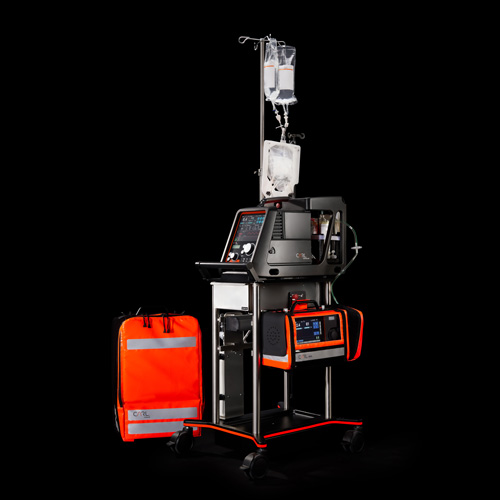CARL. in der Asklepios Klinik St. Georg in Hamburg im Einsatz
Das vom Deutschen Rat für Wiederbelebung (GRC) zertifizierte Hanseatic Cardiac Arrest Center in der Asklepios Klinik St. Georg in Hamburg ist auf die Behandlung von Patienten mit Herzstillstand spezialisiert. Das Zentrum ist mit rund 80 Aufnahmen derartiger Fälle im Jahr bezogen auf die Fallzahl führend in Deutschland und zählt auch international zu den ersten Adressen im Bereich der kardiopulmonalen Wiederbelebung.
Im Hamburger Zentrum arbeiten Experten interdisziplinär zusammen, um alle Patienten bestmöglich zu versorgen. „Durch das eingespielte Team, bei dem jeder genau weiß, was er zu tun hat und das schnell umsetzt, können wir deutlich mehr Patienten nach einem Herzstillstand retten“, so Prof. Dr. Stephan Willems, Chefarzt der Klinik für Kardiologie und Internistische Intensivmedizin der Asklepios Klinik St. Georg.

„Studien haben inzwischen belegt, dass das Outcome, also das gesundheitliche Ergebnis beim Patienten, von der Rettungskette abhängt“, erläutert Willems. Bei den interdisziplinär aufeinander abgestimmten Arbeitsschritten während einer Wiederbelebung spielt außerdem die technische Ausrüstung eine wichtige Rolle.
Deshalb nutzt das Hanseatic Cardiac Arrest Center (HaCAC) nun auch die CARL Technologie, mit der es erstmals möglich ist, einen Patienten nach einem Herzstillstand inner- wie außerklinisch mithilfe einer extrakorporalen Zirkulation individualisiert zu behandeln.
Laut Dr. Eike Tigges, Leitender Oberarzt der Klinik für Kardiologie und Internistische Intensivmedizin der Asklepios Klinik St. Georg, ist das HaCAC damit eines der wenigen Zentren weltweit, in denen das hochentwickelte Gerätesystem bereits in der Initialphase des Markteintritts eingesetzt wurde.
Quelle: Online-Bericht der Pressestelle der Asklepios Klinik St. Georg in Hamburg:
Wie Menschen nach einem Herz-Kreislaufstillstand gerettet werden können (asklepios.com)
Close